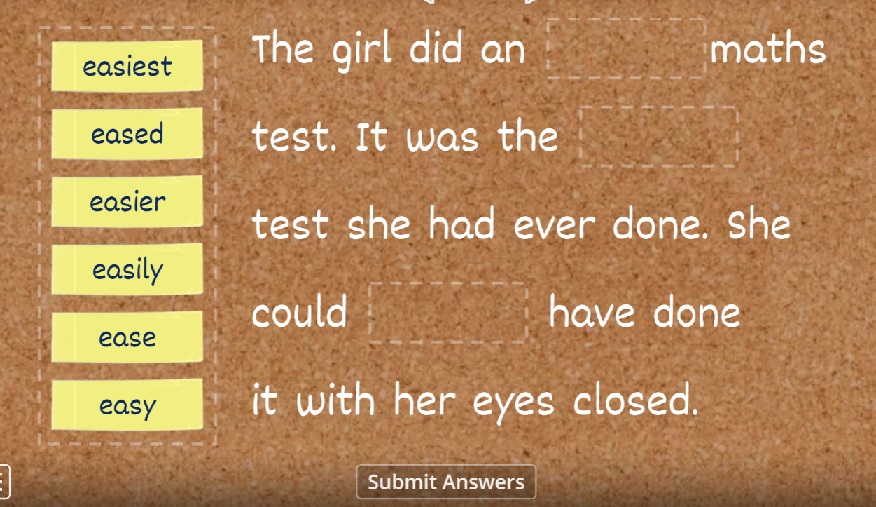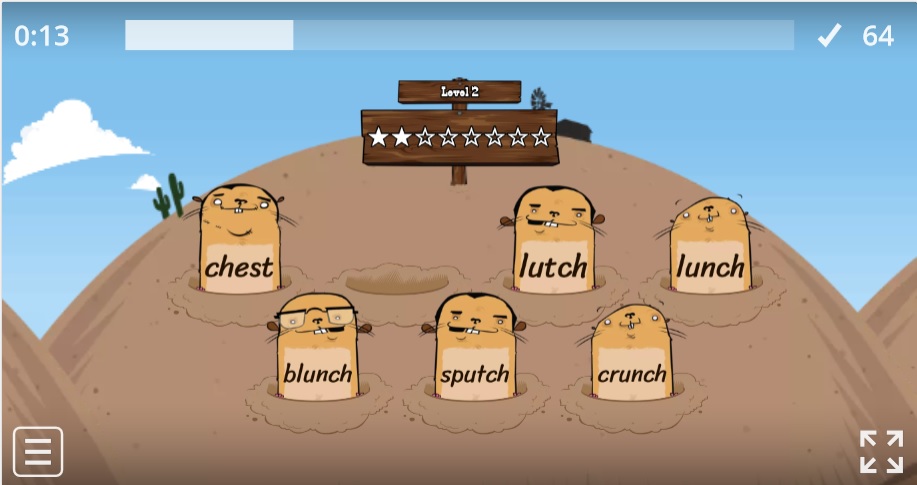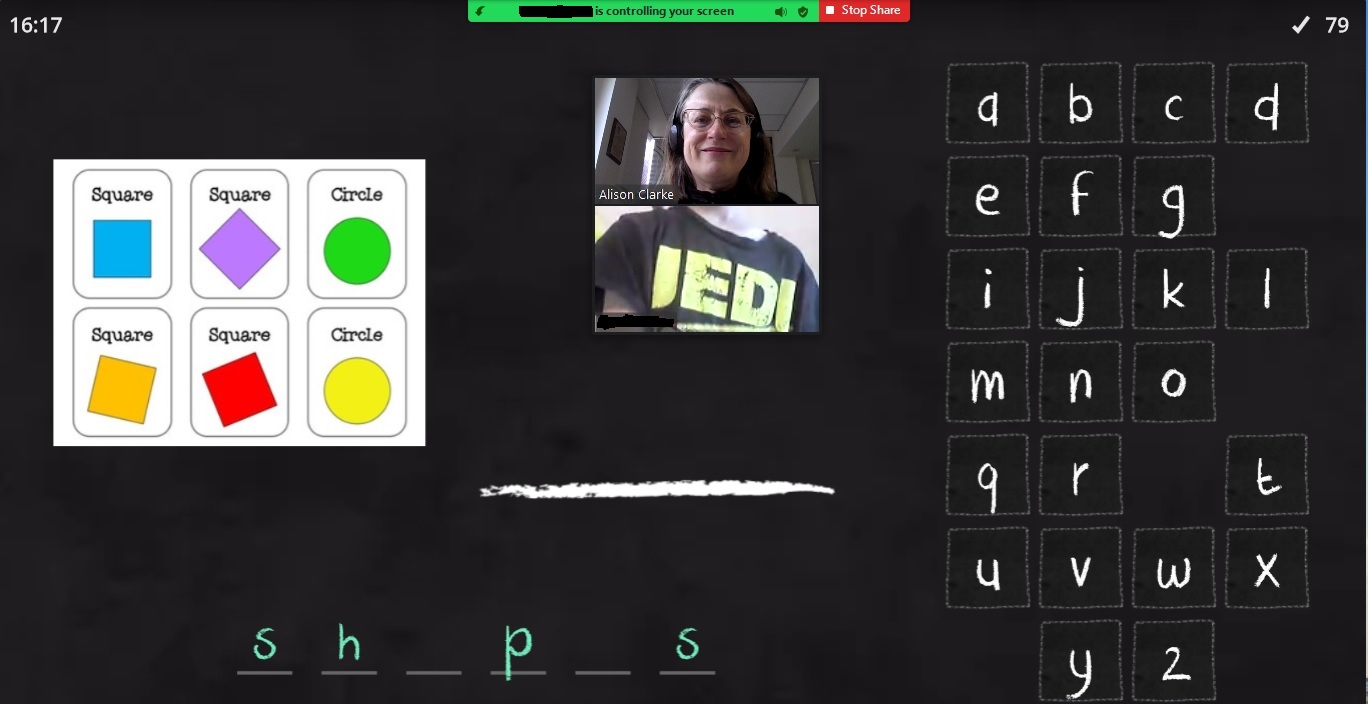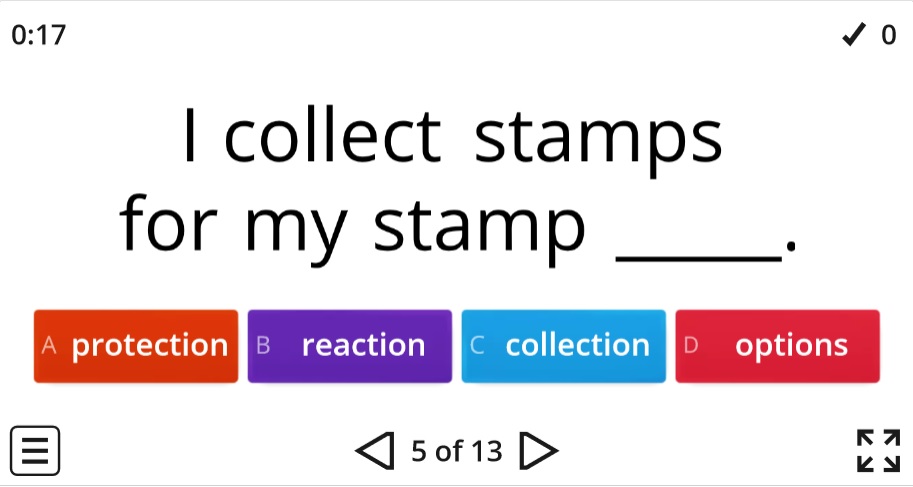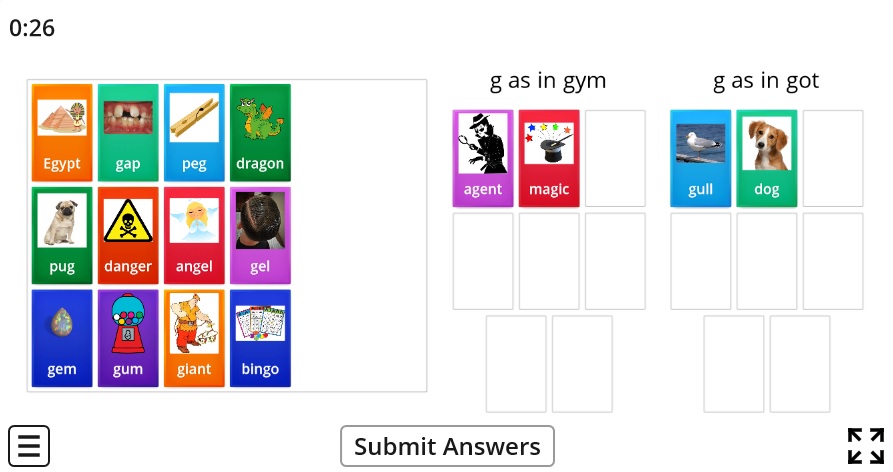Free Flex-It game, holiday assessments and spelling boosters
0 RepliesIt’s the last week before our school holidays, a good time to play educational games, so I’ve just put a free sample Flex-It game in the Spelfabet shop.
Download and print it on 3 sheets of light card, laminate it if you like, and cut it up. Use it to explicitly teach learners to approach the letter ‘a’ flexibly in words of more than one syllable, trying the sound in ‘apron’ if the sound in ‘apple’ doesn’t yield a real word. The ability to think flexibly and try other plausible sounds is essential for successfully sounding out long words.
Hope you and your learners like it!
(The next part of this blog post is only relevant to people in Victoria, Australia)
Holiday assessments
The Spelfabet Speech Pathologists in North Fitzroy have some availability to do speech and language assessments in the school holidays, if you need a report to accompany a funding application, or are just concerned that a child might have listening/speaking difficulties. We can also screen a child’s hearing using the Sound Scouts app, and assess phonological processing and word-level reading/spelling skills.
We know there can be a long wait for school-based Speech Pathology services, and that many applications for extra support at school are due soon. Assessment cost depends on session length, but reflects the NDIS rate for therapists. Private health insurance rebates may apply, or GPs may provide Medicare Care Plans. Click here to make a referral.
Spelling boosters
It’s hard to enjoy writing when you’re struggling with spelling. Also in the school holidays, we’re offering a small number of three-hour individualised spelling booster sessions, to clear up misconceptions about spelling evident from writing samples and/or standardised tests, build spelling skills and confidence, play some games and have some fun. The cost is $650 including a report. Again, rebates may apply if you have health insurance or a Medicare Care Plan. Click here to make a referral.
That’s it! I’m learning to write short blog posts! Happy holidays!
Alison Clarke, Speech Pathologist
Holiday groups, new games, 30% off sale
0 RepliesA quick blog post about three things: therapy groups for Melbourne F-2 children in January 2025, 15 more Flex-It card games to teach Set for Variability/pronunciation correction in polysyllable words, and a bumper end of year Spelfabet online shop sale (use the code “Happy Holidays!” at the checkout for 30% off).
January therapy groups
We still have a few places in our 20-24th January therapy groups for young struggling readers/spellers (2024 Foundation to Year 2 children). If you know a young child in Melbourne whose school report says they’re not keeping up with peers on literacy, and who might like to join an intensive group, please let them know. More details are here.
We now have a bunch of kids who have been coming back most holidays, as young children are often too tired to do therapy outside school hours during term. Groups can be more fun than individual sessions, and allow children to make friends with peers who are also finding reading/spelling a bit tricky.

More Flex-It card games
A second tranche of 15 Flex-It card download-and-print games are now in the website shop, you can find them here. These games give children controlled practice trying a different target sound for a target spelling (Set for Variability/pronunciation correction), if their first attempt at sounding out a word isn’t successful, e.g. if they rhyme ‘very’ with ‘furry’ instead of ‘berry’.
Each printable game costs an Aussie dollar (or 70c for the rest of 2024) plus GST. Each prints in colour on three sheets of A4 cardboard. Print and laminate what you need, cut them up (or helpful older kids might like to flex their scissor skills) and you’re ready to play. The original 15 Flex-It games have also been improved slightly, so if you already have the first set, log back into the shop to download the new files (go to My Account, reset your password if it’s forgotten).
30% off everything in the Spelfabet shop
To congratulate everyone for getting through the year, we’re having a bumper 30% off everything sale in the Spelfabet online shop until the end of 2024.
Choose the things you want from the shop – embedded picture mnemonics, decodable books, games, quizzes, workbooks, whatever – then type “Happy Holidays!” into the coupon box at the checkout for the discount. If you dislike laminating and cutting up, we probably can’t post the printed Short Vowels game in the video below to you before Christmas, but postage on a class set costs the same as a single game, and would arrive anywhere in Australia before the 2025 school year (sorry we don’t mail them overseas).
May your festive season be full of rest, fun and love, from everyone at Spelfabet.
New Flex-It games
4 RepliesIntroducing our new, affordable, download-and-print set of games for explicitly teaching and practising Set for Variability skills: Flex It. There are 15 games so far, but more to come soon:

Dr Marnie Ginsberg of Reading Simplified gives a great explanation of the importance of Set for Variability in reading here, including references, or you can listen to her on the Triple R Teaching podcast. So here’s a quick version, please see hers for more details (and yes, I’ve sent Marnie the games and she’s happy to share the term ‘Flex-it’).
Many letters/spellings can represent more than one sound, e.g. the:
- ‘a’ in ‘atom’ and ‘apron’,
- ‘e’ in ‘even’ and ‘ever’,
- ‘i’ in ‘item’ and ‘index’,
- ‘ow’ in ‘show’ and ‘shower’,
- ‘g’ in ‘goblin’ and ‘giant’.
Kids thus often include an incorrect but plausible sound in a word when they sound it out. They say things like ‘joblin’ for ‘goblin’ and ‘eever’ for ‘ever’. Kids with strong Set for Variability skills can often then correct themselves, and get the word right. Other learners need to be explicitly taught how to do this.
Our “Flex It” games contain words with a shared spelling that represents two sounds (or three in the case of the o/solve, o/stove, o/some game). Most words on the cards contain two syllables. For example, here are some of the cards for the a/atom, a/apron game:

Here’s how to play Flex-It, this time with the o/often, o/open cards:
You can get the games now from the Spelfabet shop. Download and print each game on three A4 sheets of light cardboard, laminate, cut cards up or ask some helpful older students who’ve finished their work to show off their scissor skills. Repurpose vegetable-bunch elastic bands to hold each deck together for extra good karma.
Show learners the words on the cards and remind them that they’ve learnt that (whatever) letter/spelling can represent both (whatever) sound and (whatever other) sound. Model trying both sounds in a few less-common words in the deck e.g. ‘fragrant’ and ‘flagon’, putting any unfamiliar words in sentences, and maybe showing them a picture (hooray for instant internet pictures of flagons etc.)
Shuffle your deck and deal 5 cards to each player, put the rest face down in the middle, turn over the top card and take turns to play cards with the same colour or symbol, or a ‘change’ card, until someone wins by running out of cards. Learners must read the word on each card as they play it. If a learner mispronounces the target sound in a word, ask them to try the other sound. Just tell them the sound if it’s slipped their mind. Provide lots of specific praise when learners correct their mispronunciations.
Thanks to Elle Holloway for the idea, and setting up the template, so I could just nerd on the words.
Myself and other Spelfabet staff will have a table at the SOTLA event with Emily Hanford in Melbourne this Saturday (squee, when we’re not lining up for a selfie with Emily), if anyone there wants to try out these games.
Hope they help lots of kids to tackle reading words flexibly and successfully.
Alison Clarke
New 2 ways to spell vowels cards, including a free deck
0 Replies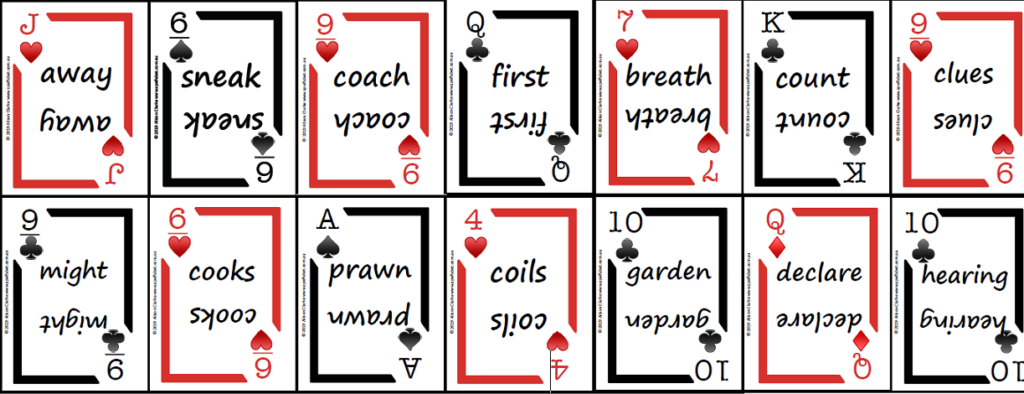
Some students need smaller-than-average steps and extra practice to get spelling patterns into long-term memory. Games are a great, nag-free way to get in lots of targeted, extra repetitions.
The newest set of download-and-print Spelfabet phonics playing cards has 14 decks, each with one vowel sound spelt two ways, and includes a free sample deck:
(more…)Affordable basic phonics kit
6 Replies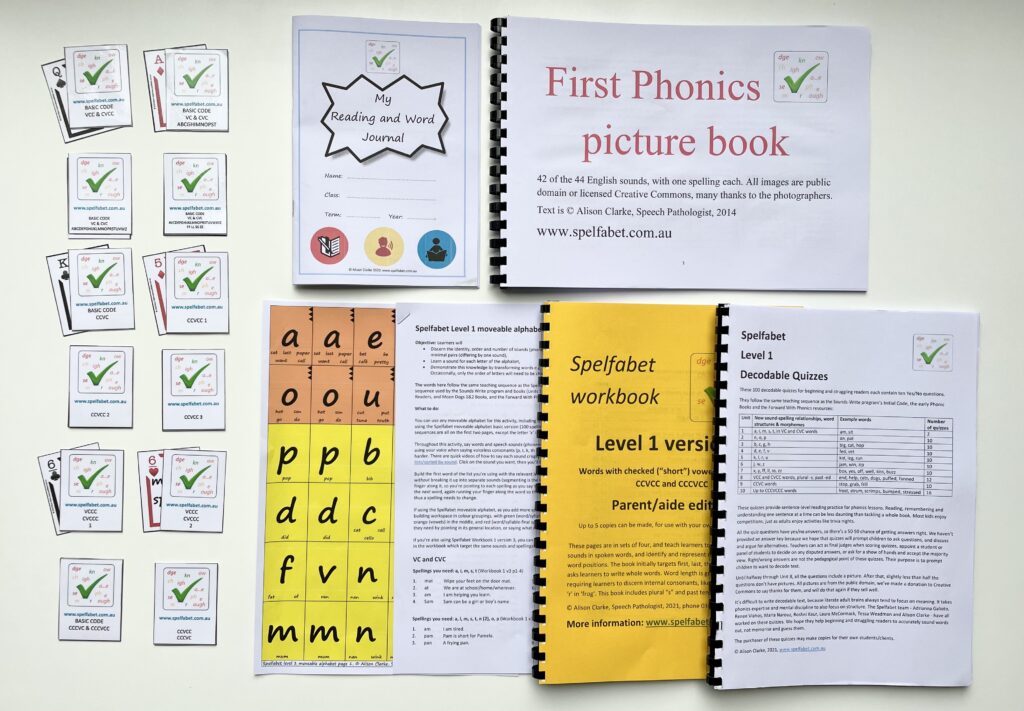
Thanks to the pandemic, many children seem to have done year or more of disrupted schooling without having learnt to read or spell much. A new batch of Australian five-year-olds start school soon, where many will (happily) be taught the systematic, explicit phonics that’s helpful for all, harmful for none and crucial for some*, but many won’t.
The download-and-print Spelfabet Level 1 kit aims to equip you to help beginners and strugglers of any age learn to read and spell one-syllable words with up to seven sounds. The kit follows this teaching sequence (the same as the Sounds-Write program):
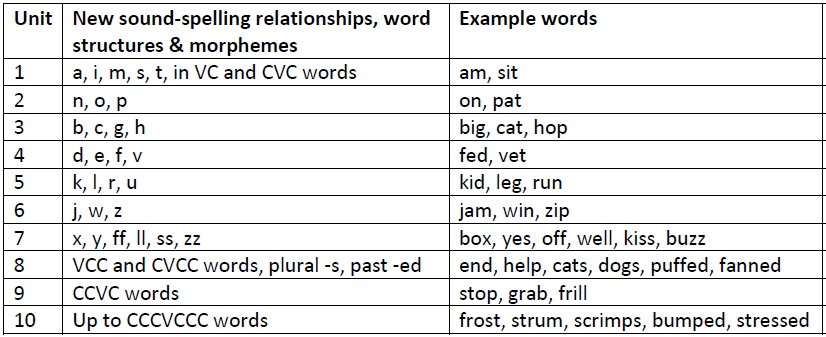
The kit contents are a workbook, quizzes, moveable alphabet, word-building sequences, playing cards, reading journal and phonics picture book. The only difference between the parent/aide kit and the teacher/clinician kit is how many copies of the workbook you may print (5 or 30 copies).
All the items in this kit are available separately from the Spelfabet website, except the simplified Moveable Alphabet, which contains only the spellings needed for Level 1. However, it’s cheaper to get the kit than each item separately ($55 including GST for the parent/aide version and $65 for the teacher/clinician one).
Decodable books for reading practice which follow the same teaching sequence include the Units 1-10 Sounds Write books including free e-books, the Units 1-10 Dandelion and Moon Dogs books from Phonic Books, and the printable Drop In Series Levels 1 and 2.
If this kit is too basic for your learner(s), more difficult kits will be available soon.
* See article by Catherine Snow and Connie Juel (2005) at https://psycnet.apa.org/record/2005-06969-026
1000 decodable quiz questions
7 RepliesAt last, our 100 download-and-print phonics quizzes for beginning readers are available here. Each has ten questions, and fits on an A4 page. Most questions have pictures. You can download a free sample of ten of them here. Here’s a 2 minute video about them.
Kids aren’t usually keen on tests, but enjoy quizzes, just as adults enjoy trivia nights. Reading and understanding a sentence at a time can be less daunting than reading, remembering and understanding a book, even a short one.
These quizzes follow the same teaching sequence as Sounds-Write Units 1-10, and the early Phonic Books and Forward With Phonics resources, since our client base is mostly struggling older learners. If you’re using a slightly different phonics teaching sequence, just check that you’ve taught all the sound-spelling relationships in each quiz before using it, perhaps as a review activity.
Writing decodable text is hard work. The literate adult brain constantly wants to focus on meaning not structure. It takes lots of discipline to think of good questions that don’t contain words that are too hard, especially at the early levels. The whole Spelfabet team has been involved in writing these quizzes, and have been extremely tolerant of my initially vague ideas and constant revisions. It’s taken much longer than expected.
We haven’t included an answer key because we hope the quizzes motivate children to ask questions and propose alternative answers/interpretations, argue for a ‘maybe/it depends’ option and otherwise think and talk. You can act as judge, assign a judging panel, or go with the majority view. Right and wrong answers are not as important as prompting children to read accurately and successfully.
We hope beginning and struggling readers enjoy and request these quizzes, and that they help build children’s reading ‘muscle’.
Top 10 online PA/phonics resources/activities
23 Replies200+ days in COVID-19 lockdown and no clear end in sight, so I’m scratching around for fresh ways to target phonemic awareness, phonics and morphology online. Maybe you are too. Here are some things I was SO GRATEFUL to find. A million thanks to their creators. Please add your favourite resources and ideas in the comments.
- Wordwall
I think my head would have imploded in the last 18 months without a Wordwall subscription (AUD$12 a month for all the games). I’ve made lots of activities which you can use for free, and so have many others.
Only the crossword, hangman, spell the word and anagram games require spelling rather than reading to play, but not to create. I therefore get kids to help me create a game online: first choose a game, type the target words/sentences into it, then play the game, then go on the leader board. Playing the game again can be part of the homework, either on a computer or as a printable crossword or word search. It’s also possible to make little moveable alphabet/sound swap activities in the word magnets activity.
2. Phonic Books Moon Dogs At Home books and other resources
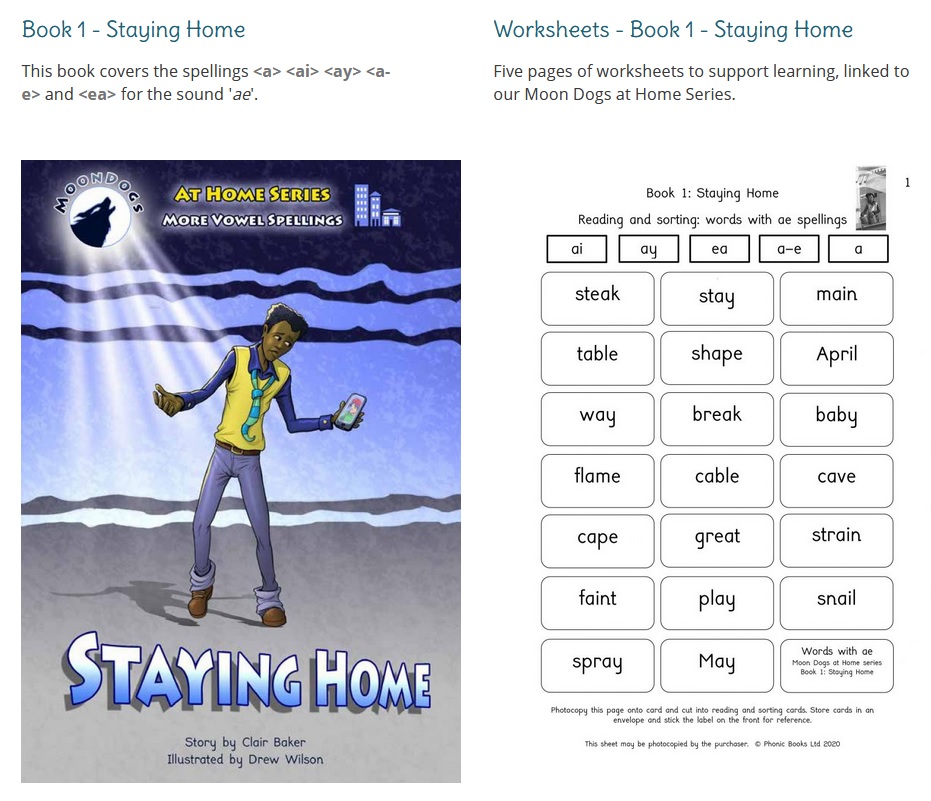
We use the physical Phonic Books resources a lot, and have found their free online resources very useful during our lockdowns. So generous, and so relevant. A lot of the WordWalls we’ve created also match their books’ teaching sequences.
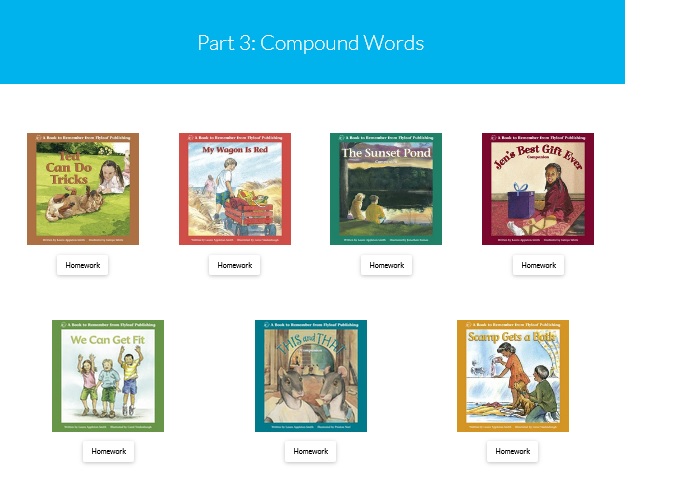
Flyleaf’s Online Portal contains lots of cute books from the UK which are perfect for online use, and all free at present, because of the pandemic. Again, so generous! Jen’s Best Gift Ever is my favourite, click here to read it, and here’s a comprehension quiz I’ve made as a follow-up activity (use it as a Gameshow Quiz for more pizazz).
4. ICT Games
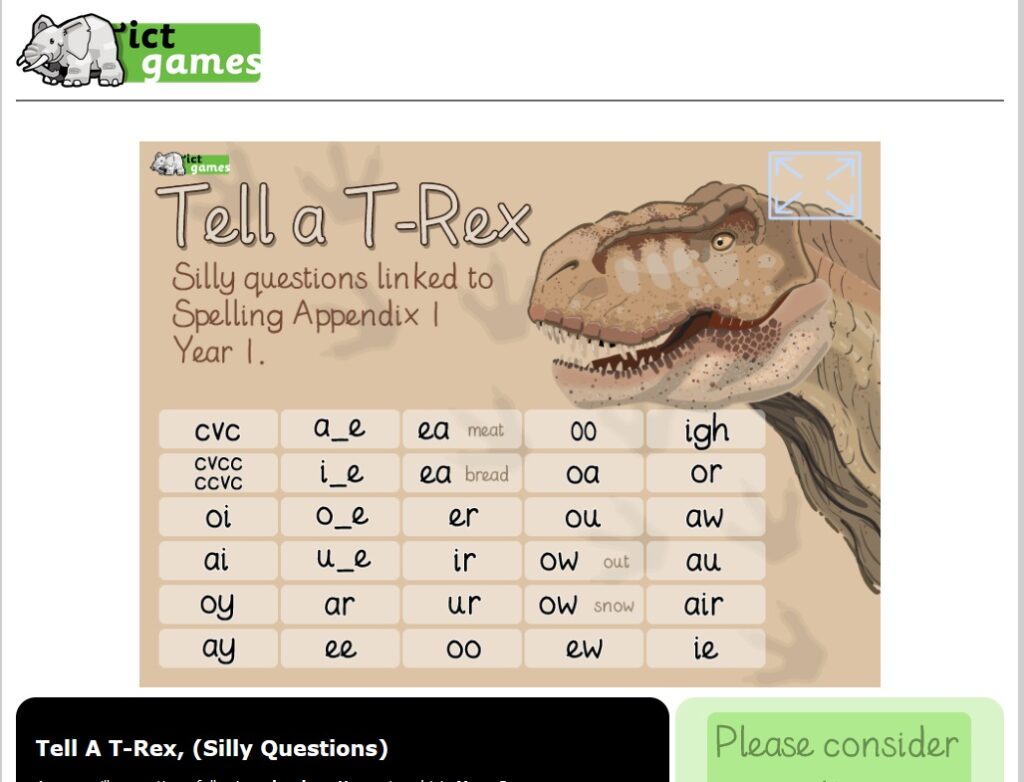
ICT games are all free online, and a quick, fun way to warm up or finish off a session. I often ask kids to type their own lists into Help A Hedgehog, then see how many they can read before the 90 second timer runs out. Other favourites are Tell A T-Rex, Poop Deck Pirates, Viking Full Circle, Forest Phonics, and Phonics Finder. This site runs on a donation model because the husband-and-wife team behind it think no child should be prevented from learning by lack of money. So if you can afford to donate, please do.
5. Sounds Write Practitioners’ Portal and freebies
All of us at Spelfabet have trained in the linguistic/synthetic phonics program Sounds-Write, so we have access to the Sounds Write practitioners’ portal, which has heaps of ready-to-use activities following their teaching sequence. There is also a facebook page where Australian and NZ Sounds-Write practitioners share ideas and resources.
Sounds-Write also have quite a few free resources which can be used online such as decodable books.
6. Little Learners Love Literacy apps and other resources
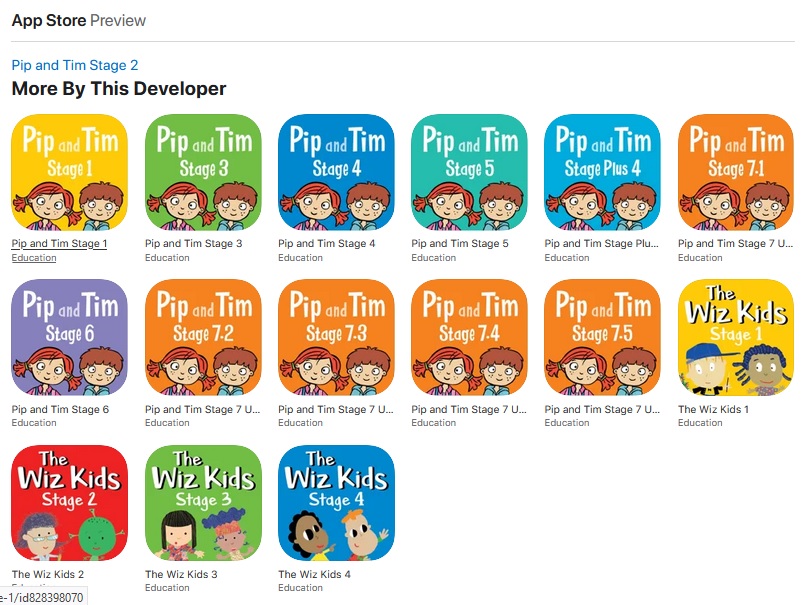
The app versions of the lovely LLLL books have been a great way to show young clients the books, by sharing the iPad screen online. These books were made available free during the COVID lockdowns. Lots of paper-based LLLL activities also lend themselves to online use, see item 8 below. If you’re working online on Zoom, you can share your iPad/iPhone screen online (either with bluetooth or plug it into your computer), but kids can only see it, not operate it (unless I am missing something). That means they can read whatever decodable texts you have on your iPhone/iPad.
Not sure whether this works on online platforms beyond Zoom, or whether you can share Android screens, sorry. The internet will probably be able to tell you, with videos, if it is possible.
7. Powerpoint versions of decodable texts
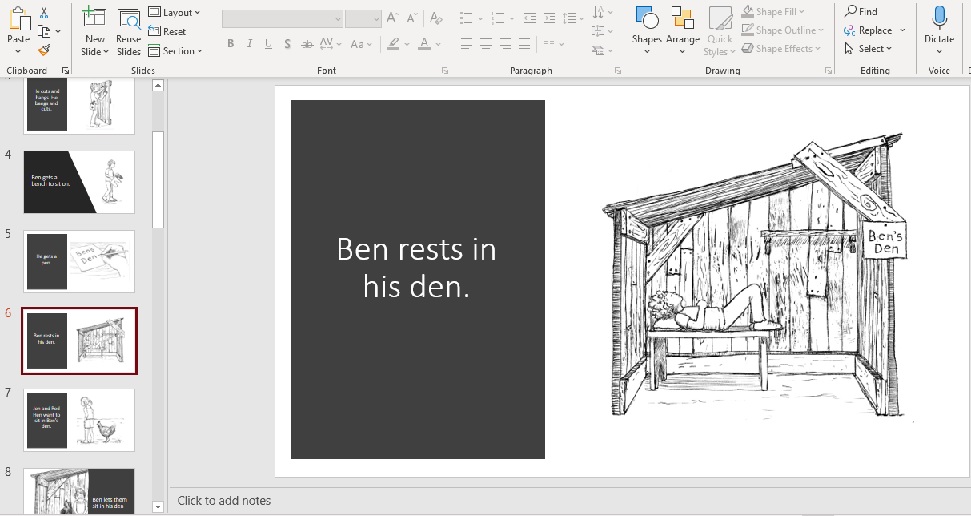
Some kids with good keyboarding skills like typing a simple story to dictation, to create a book they can then show a parent or teacher. I’ve used some Phonics With Feeling books for this, with author permission. I take screenshots of the pictures and paste them onto slides, type the text, then use Powerpoint’s formatting suggestions to make it look more schmick. Then I save it, delete the text and save it again under a different file name. Voila! A simple onscreen reading then spelling activity with large text.
8. Adobe Acrobat Reader editing tools
We use Zoom and it has been excellent, but I rarely use their whiteboard or editing tools. The free Adobe Acrobat editing tools work much better with pdfs. You can scroll through homework and cover it in ticks. You or the learner can type, change the font size and colour, and move text around. You can underline or put boxes around target words in sound searches (we play a guess-how-many-jellybeans-in-the-jar game with these, first guessing how many words with the target sound there will be). I just wish I could turn off the predictive text! (any ideas? I’ve tried everything!)
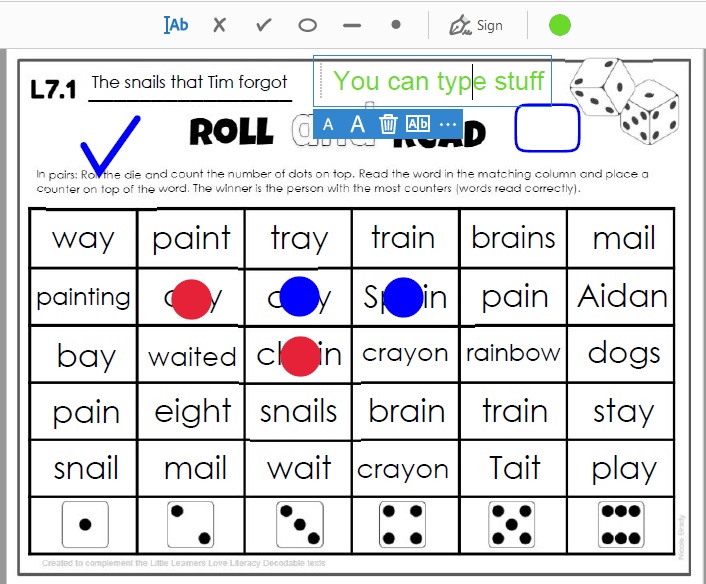
You can also play games (like the one above from Nicole Brady) using big dots as counters. Sounds-Write, Phonic Books and Little Learners Love Literacy books all have paper-based games that can be scanned as pdfs and used this way, and there are digital versions of the LLLL books. I use the iPad or iPhone app Make Dice held up to the camera for dice games, as I’m rubbish at online dice (all tips gratefully received). Make Dice can also replace the spinner for the Phonic Books Spin, Read and Spell games.
9. Kahoot!

I’m sad to say that I’ve only recently figured out that Kahoot! can motivate many kids to do quite a lot of reading. The best music teacher in the world (hi Roz!) told me it had revolutionised her lessons. Kids are often familiar with it from school, and think it’s fun and cool. We’re writing some downloadable quizzes now which should be easy to turn into Kahoot!s.
10. Jamboard is no longer available in 2025, Really Great Reading has letter tiles worth checking out, but I am still working out how their subscription works.
Google’s Jamboard was another useful tool I wish I’d discovered earlier. It was like an online whiteboard with colourful post-it notes, from which I made simplified versions of my moveable alphabet for word-building sequences, e.g. here the learner would be asked to change “stitch” into “switch”:
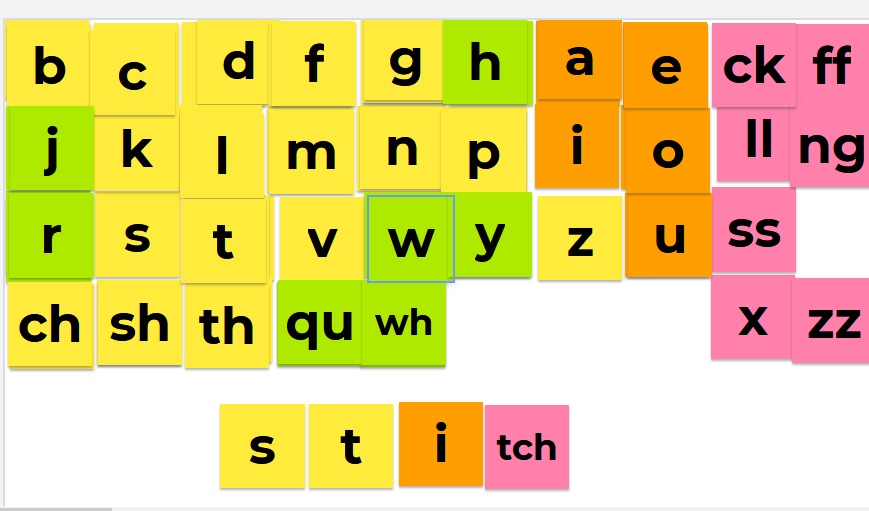
Kids tend not to stretch or rotate the tiles the way they have in other formats I’ve tried using for this activity. Jamboard was also a quick way to create neat word sorting activities:
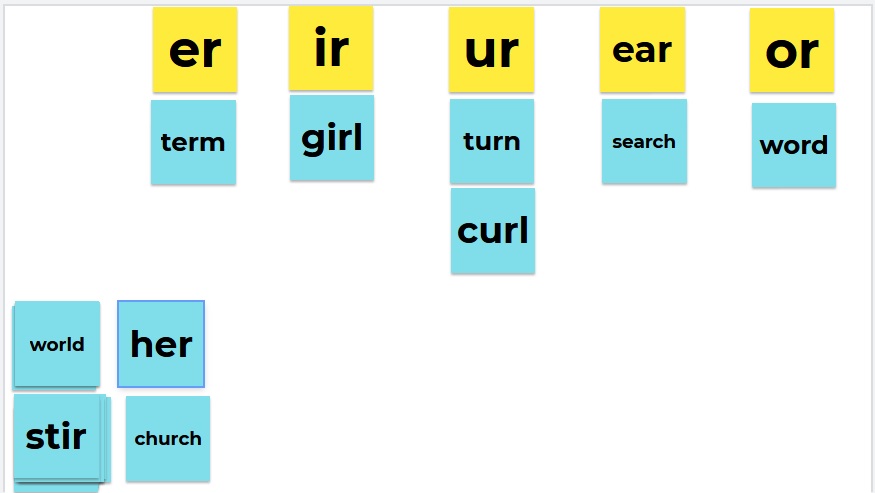
I got words for these sorts from my website’s sorted-by-sound lists (for same-sound-different-spellings activities) or sorted-by-spelling lists (for same-spelling-different sounds activities).
I hope you found some useful information in all that, especially if you’re still working online too. Pretty please leave any great ideas you have to share in the comments.
2025 extra thoughts: There are lots of free, downloadable decodable texts on the Freereading website, and the Preschool University website also has affordable digital materials including decodable texts. Great for dictation, as the learner can read the text on screen and think about anything that might be tricky in it before starting to write/type.
If the learner has a parent/support person with a phone with a camera and a different email address from the one the learner is using to sign in to the Zoom, they can also join the Zoom from their phone and use it as a document camera. This allows you to see what the learner is writing. The phone can be inserted near the top of a stack of books, cans of beans, whatever, with the lens sticking out, and then the learner’s paper/whiteboard can be placed under the lens and the camera focussed/adjusted as necessary.


